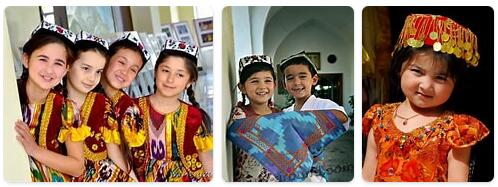Yearbook 2016
Uzbekistan. In August, President Islam Karimov suffered from brain hemorrhage and received intensive care in hospital. Rumors of his death circulated for some time, and in early September it was officially confirmed that the 78-year-old president had died.
The current population of Uzbekistan is 33,469,214. Karimov had ruled the country with iron hand for more than a quarter of a century, and his death sparked speculation about a power struggle within the regime. Under the Constitution, the Senate president would take over as acting president, but the president proposed to the more experienced Prime Minister Shavkat Mirziyoyev. It was appointed by Parliament and described as a guarantee of continuity and stability. Mirziyoyev said he would run for office in December.

Karimov had tried to maneuver between the great powers to get support from different directions. After his death, Russian President Vladimir Putin visited Tashkent and, in a meeting with Mirziyoyev, he hoped that Karimov’s policy would continue. Putin said that Uzbekistan could count on Moscow as its most reliable friend. It was interpreted as a call for continued hard line against dissent. The United States, for its part, sent a mid-level diplomat urging the new leader to improve Uzbekistan’s human rights credentials. According to human rights groups, hundreds of political prisoners are in Uzbek prisons, and torture is common.
According to thereligionfaqs, Uzbekistan is heavily dependent on the Russian economy, mainly because a few million Uzbek citizens are estimated to be guest workers abroad and especially in the Russian Federation.
In October, media reported that rival clans opposed Mirziyoyev alone to take over Karimov’s power. It was reportedly agreed that Mirziyoyev would face out with the title of president, but the decision-making would be shared with Karimov’s security chief Rustam Inoyatov and Deputy Prime Minister and Finance Minister Rustam Azimov. The settlement was said to be made between the region-based clans that dominate Uzbekistan’s economy and society.
In October, a court sentenced 72-year-old political prisoner Samandar Kukanov to another three years in prison. Kukanov had already served 20 plus two years in prison for alleged embezzlement and violation of prison rules. According to the opposition, Kukanov was seen as a personal enemy of Karimov because of his criticism of him and his support for opposition movements.
The United States called on Uzbekistan to pardon Kukanov on humanitarian grounds, and barely two weeks before the presidential election, Kukanov was surprisingly released.
Four candidates participated in the December presidential election. Mirziyoyev was nominated by Karimov’s power party the Liberal Democratic Party, and although the other candidates and their parties characterized themselves as oppositional, they essentially followed the official political line.
According to official data, Mirziyoyev won by over 88% of the vote, and turnout was said to be almost 88%. According to the OSCE, the election highlighted the need for radical reform in Uzbekistan. No election in the country has been described by the OSCE observers as democratic and free. Deputy Prime Minister Abdulla Aripov was appointed to succeed Mirziyoyev as head of government.
At the end of the year, a committee of the European Parliament approved a textile trade agreement with Uzbekistan, which, according to human rights activists, means that the EU benefits from forced labor in the Uzbekistan cotton industry. As a result, a previous decision to allow the agreement to be rested due to allegations of child labor and forced labor was revoked. According to EU parliamentarians, Uzbekistan had made progress by removing children from the fields, but the agreement was said to be conditional on actions also against forced labor for adults. The agreement was also approved in the European Parliament.